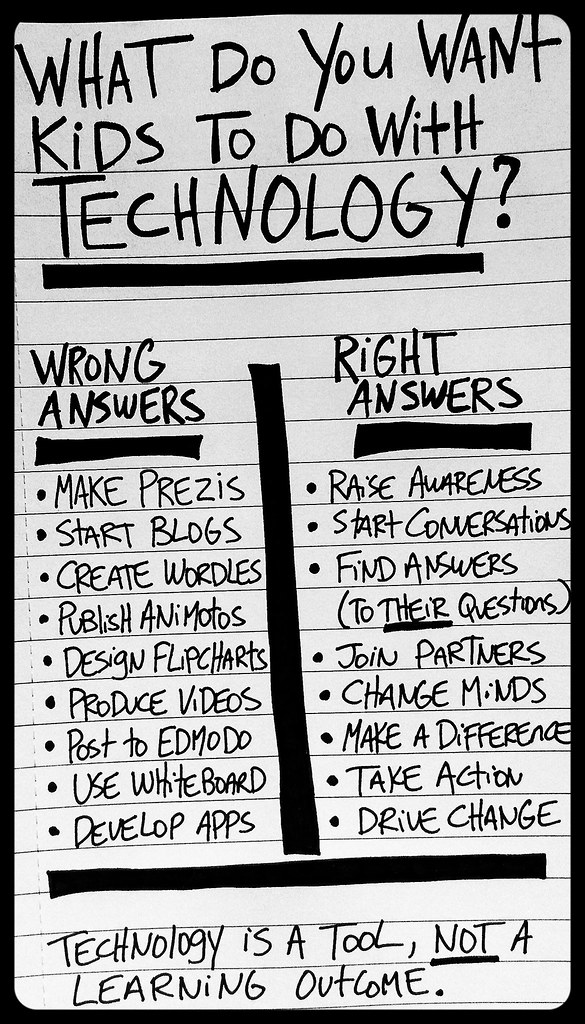 |
| Image by William M. Ferriter [CC BY 2.0] |
I love this, but I want to disagree ever-so-slightly with that last comment at the bottom...
Not the idea that "Technology is not a learning outcome"--I'm fully onboard with that. We need to get beyond teaching "computers" as a separate subject area!
But I'm cautious about saying things like, "Technology is just a tool." The thing is, the tools we use shape us. Tools are not neutral. You use a hammer and a hoe and a stethoscope in VERY different ways, but all of them are tools, right? The old adage says, "If the only tool you have is a hammer, every problem starts to look like a nail." The same is true for the hoe and the stethoscope too: if it's the only tool available to you, all the problems begin to look like weeds, or pneumonia.
We need to be thoughtful about the technological tools we choose to introduce into our teaching practices. While the technology definitely is not the point of the learning, the tools we choose to use will definitely have an impact on our pedagogy, and even on the content we teach. It's all contextualized, and it's all connected.
I've share this image before, and I think it's helpful:
 |
| Reproduced by permission of the publisher, © 2012 by tpack.org |
This graphic illustrates EdTech thought-leaders Punya Mishra and Matthew Koehler's conception of Technological Pedagogical Content Knowledge--a means of thinking about the way these different elements interact in our current, high-tech classrooms.
The key thing to remember is that technology does not replace pedagogy, nor does it replace content knowledge. All three domains, while they overlap, are distinct. Certainly, good pedagogy can be supplemented and supported by good technology use. But good teaching--good pedagogy--can't really be replaced by technology. They simply aren't the same domain.
So when we think about what we want students to do in school, I think the graphic at the top of this post is a very helpful reminder! It's not about the technology, it's about the content we want students to learn, the experiences we want them to have. And our pedagogy supports and enhances that in conjunction with the technologies we choose.
I think these are then the questions we should be asking whenever we are thinking about using technology, and in this order...
- What do I want students to do? To learn?
- How will I help them get there?
- Can technological tools be a value-add to help them?
What do you think?
Perfect.
ReplyDeleteI like it, Dave...
ReplyDeleteThat graphic -- which I whipped up in about 20 minutes at a bar while waiting for a buddy to watch a game -- has really sparked a bunch of conversation.
People push -- like you did -- against the notion that technology is just a tool. They feel like that diminishes the real impact that technology has on who we are and what we do.
People also push against my decision to use the words "Wrong" and "Right." They feel like anytime you make evaluative judgments about the decisions people are making -- particularly #edtech rookies -- you shut down conversations and action in an unhealthy way.
I wish I could say that I made both of those choices intentionally, but I didn't. This was literally a quick graphic keeping me busy because my buddy was late!
But I LOVE the controversy that those word choices have made simply because they start conversations. And in the end, those conversations matter WAY more than my graphic does!
Rock right on,
Bill
Thanks for taking the time to comment, Bill. And I'm right with you: I think the conversations that are happening as a result of this lovely little graphic are really the key. (Thanks for sharing the story behind it!) I hope this post will just serve as fodder, keeping those conversations going.
Delete